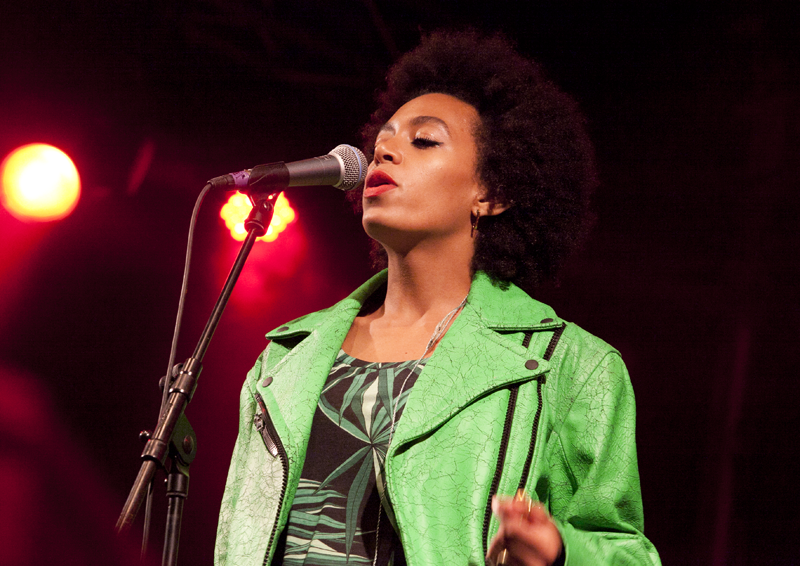Earlier this week, Saint Heron — the editorial extension of the Solange Knowles-helmed record label — published an interview with Brandy about the making of her new album, Full Moon. From the outset, writer Asia Burris explains the enormous impact the R&B royal made on her own identity growing up — from her soulful sounds to Moesha style — and parlayed these personal connections into a really insightful conversation about Brandy’s larger impact on young black women. As Knowles herself pointed out in a series of tweets three years ago — when Brandy released Two Eleven — these critical viewpoints are too often absent from indie-centric music websites.
“Some of these music blogs could actually benefit from hiring people who REALLY understand the culture of R&B to write about R&B,” she tweeted in 2013. “Like you really should know about deep Brandy album cuts before you are giving a ‘grade’ or a ‘score’ to any R&B artist. And ivy league credentials don’t give you any insight on ‘grading’ a rappers body of work…when you’ve had no access to the REAL culture.” Apparently, some holier-than-thou indie talking heads scoffed at the prospect of a Brandy ‘deep cut’ and slagged off the seriousness of Solange’s comments. Not this time, though.
The music business was built brick by brick off the backs, shoulders, heart ache and pain, of black people, and everyone is just exhausted.
— solange knowles (@solangeknowles) February 4, 2016
Early this morning, Solange fired a series of tweets addressing race in the music industry: “The music business was built brick by brick off the backs, shoulders, heart ache and pain, of black people, and everyone is just exhausted,” her first tweet read. She explained that the “Last two days has brought up so much emotion, recalling when it was made a joke by ‘indie white guys’ that I brought up Brandy album cuts. When to be honest, don’t you ever dare speak that 6 letter name, without understanding the value. The blasphemy.”
Knowles then called out New York Times critic Jon Caramanica, who StereoGum suggests “made some comment, at some point, about how the ‘Brandy album cuts’ line amounted to Solange biting the hand that was feeding her.” She wasn’t having any of that. “Ps:@JonCaramanica, Don’t you EVER tell a Black woman, not to ‘Bite the hand that feeds you’ while speaking in reference to white people. My father ‘fed me’ when he was hosed down and forced to walk on hot pavement barefoot in civil rights marches in Alabama @joncaramanica,” she Tweeted last night.
With all due respect, the people who you named were responsible for my “success” wish they could feed me half of what growing up in 3rd Ward
— solange knowles (@solangeknowles) February 4, 2016
It goes without saying that indie music blogs are not the hands that feed Knowles’ success — her singularly compelling sounds and expert ear for emerging talent are only some contributing factors. “Houston Texas, fed me,” she shot back. But in light of Saint Heron’s new Brandy interview, that “biting the hand that feeds” notion only serves to reinforce the urgency of Solange’s initial point. Predominantly white, male alt-centric blogs cannot persist to be the music industry’s critical gatekeepers. As Wet’s Kelly Zutrau pointed out when I interviewed her recently, only one band that even contains a woman — The Knife — has been awarded Pitchfork’s Album of the Year award in the last 10 years (the Swedish group took top honors in 2006). In its entire 17 years, less than five projects that even resemble R&B — among them Frank Ocean’s Channel Orange and FKA twigs’ LP1 — have even placed in the top five.
Sure, Pitchfork and Coachella (which also has a pretty shitty diversity track record) started off as entities specifically geared towards alt dude rock. But times have changed, and both institutions have expanded to feature exciting artists from across the musical spectrum. And yet, much like film — where only about 17% of top critics contributing to Rotten Tomatoes are women (Meryl Streep personally counted) — many positions of influence in music are principally occupied by white men. Music transcends words, but without diverse writers lending insight into its context, the meaningful discourse that shapes our understanding is cripplingly narrow.
Top marks to Solange for creating an independent space that provides these insights into R&B’s sonic intricacies, artistic merit, cultural significance, and lived experience. The rest of the industry needs to catch up, quickly. “Goes back to my safe space,” Solange’s concluding tweet read — which included a shout-out to the ultimate virtual cohort of music’s most compelling contemporary artists: “(aka Group Chat cc: @MosesSumney @devhynes @Kindness @kelelam).”
Credits
Text Emily Manning
Image via Flickr Creative Commons
